Buoyant force Study guides, Class notes & Summaries
Looking for the best study guides, study notes and summaries about Buoyant force? On this page you'll find 312 study documents about Buoyant force.
Page 4 out of 312 results
Sort by
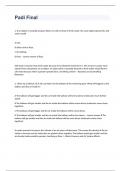
-
Padi Final questions with verified solution 2023 passed
- Exam (elaborations) • 23 pages • 2023
- Available in package deal
-
- $19.99
- + learn more
Padi Final 1: If an object is neutrally buoyant (does not sink or float) in fresh water, the same object placed into salt water would A sink. B either sink or float. C do nothing. D float. - correct answer D float. Salt water is heavier than fresh water because it has dissolved minerals in it. This means it causes more upward force (buoyancy) on an object. An object that is neutrally buoyant in fresh water would float in salt water because there is greater upward force. See Being a Div...
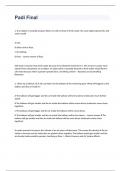
-
Padi Final1 questions with correct answers 2023 passed
- Exam (elaborations) • 23 pages • 2023
- Available in package deal
-
- $19.99
- + learn more
Padi Final11: If an object is neutrally buoyant (does not sink or float) in fresh water, the same object placed into salt water would A sink. B either sink or float. C do nothing. D float. - correct answer D float. Salt water is heavier than fresh water because it has dissolved minerals in it. This means it causes more upward force (buoyancy) on an object. An object that is neutrally buoyant in fresh water would float in salt water because there is greater upward force. See Being a Dive...
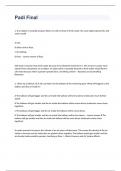
-
PADI Verified Questions & Answers 2024.
- Exam (elaborations) • 23 pages • 2024
-
Available in package deal
-
- $13.49
- + learn more
PADI Verified Questions & Answers 2024. 1: If an object is neutrally buoyant (does not sink or float) in fresh water, the same object placed into salt water would A sink. B either sink or float. C do nothing. D float. - correct answer D float. Salt water is heavier than fresh water because it has dissolved minerals in it. This means it causes more upward force (buoyancy) on an object. An object that is neutrally buoyant in fresh water would float in salt water because there is greater ...
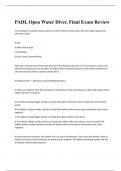
-
PADI, Open Water Diver, Final Exam Review 2023 with 100% correct answers
- Exam (elaborations) • 27 pages • 2023
-
Available in package deal
-
- $16.49
- + learn more
1) If an object is neutrally buoyant (does not sink or float) in fresh water, the same object placed into salt water would A sink. B either sink or float. C do nothing. D float. D float. Salt water is heavier than fresh water because it has dissolved minerals in it. This means it causes more upward force (buoyancy) on an object. An object that is neutrally buoyant in fresh water would float in salt water because there is greater upward force. See Being a Diver I - Buoyancy and Contr...

-
Intro to Aviation - Unit 2: Developing Flight 100% Correct
- Exam (elaborations) • 11 pages • 2024
- Available in package deal
-
- $9.99
- + learn more
Intro to Aviation - Unit 2: Developing Flight 100% Correct Ornithopter da Vinci's aircraft design propelled by pedals causing flapping wings Air Screw da Vinci's design that resembles a helicopter, which never flew Inclinometer A tool used to measure the angle of tilt, showing the position the airplane is in Buoyancy the ability or tendency to float in water, air, or other fluid Archimedes Principle the buoyant force on an object is equal to the weight of the fluid displ...
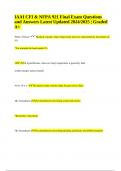
-
IAAI CFI & NFPA 921 Final Exam Questions and Answers Latest Updated 2024/2025 | Graded A+
- Exam (elaborations) • 41 pages • 2024
-
- $13.99
- + learn more
"Rule of Nines" Medical concept, where major body areas are represented by increments of 9% *For example the head equals 9% 109F In hyperthermia, what core body temperature is generally fatal within minutes unless treated? 4.0 to 10 w.c. The typical water column range for gas service lines 4th Amendment The amendment concerning search and seizure *Remember "knocking" 5th Amendment The amendment concerning pleading, grand jury and double jeopardy IAAI CFI & NFPA 921 Final Exam Quest...
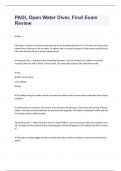
-
PADI, Open Water Diver, Final Exam Review 2023 with 100% correct answers
- Exam (elaborations) • 27 pages • 2023
-
Available in package deal
-
- $15.49
- + learn more
D float. Salt water is heavier than fresh water because it has dissolved minerals in it. This means it causes more upward force (buoyancy) on an object. An object that is neutrally buoyant in fresh water would float in salt water because there is greater upward force. See Being a Diver I - Buoyancy and Controlling Buoyancy. 1) If an object is neutrally buoyant (does not sink or float) in fresh water, the same object placed into salt water would A sink. B either sink or float. C do no...
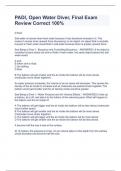
-
PADI, Open Water Diver, Final Exam Review Correct 100%
- Exam (elaborations) • 20 pages • 2023
-
Available in package deal
-
- $18.99
- + learn more
D float. Salt water is heavier than fresh water because it has dissolved minerals in it. This means it causes more upward force (buoyancy) on an object. An object that is neutrally buoyant in fresh water would float in salt water because there is greater upward force. See Being a Diver I - Buoyancy and Controlling Buoyancy. - ANSWERS1) If an object is neutrally buoyant (does not sink or float) in fresh water, the same object placed into salt water would A sink. B either sink or float....

-
PADI, Open Water Diver, Final Exam Review B questions and correct aswers
- Exam (elaborations) • 20 pages • 2024
- Available in package deal
-
- $15.49
- + learn more
PADI, Open Water Diver, Final Exam Review B questions and correct aswers D float. Salt water is heavier than fresh water because it has dissolved minerals in it. This means it causes more upward force (buoyancy) on an object. An object that is neutrally buoyant in fresh water would float in salt water because there is greater upward force. See Being a Diver I - Buoyancy and Controlling Buoyancy. - ANSWERS 1) If an object is neutrally buoyant (does not sink or float) in fresh water, t...
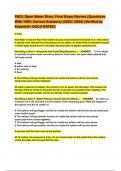
-
PADI, Open Water Diver, Final Exam Review {Questions With 100% Correct Answers} (2024 / 2025) (Verified by Expert(A+ GOLD RATED)
- Exam (elaborations) • 20 pages • 2024
- Available in package deal
-
- $17.99
- + learn more
D float. Salt water is heavier than fresh water because it has dissolved minerals in it. This means it causes more upward force (buoyancy) on an object. An object that is neutrally buoyant in fresh water would float in salt water because there is greater upward force. See Being a Diver I - Buoyancy and Controlling Buoyancy. - ANSWER 1) If an object is neutrally buoyant (does not sink or float) in fresh water, the same object placed into salt water would A sink. B either sink o...

Do you wonder why so many students wear nice clothes, have money to spare and enjoy tons of free time? Well, they sell on Stuvia! Imagine your study notes being downloaded a dozen times for $15 each. Every. Single. Day. Discover all about earning on Stuvia


